现代大学英语3课件
- 格式:doc
- 大小:37.50 KB
- 文档页数:2
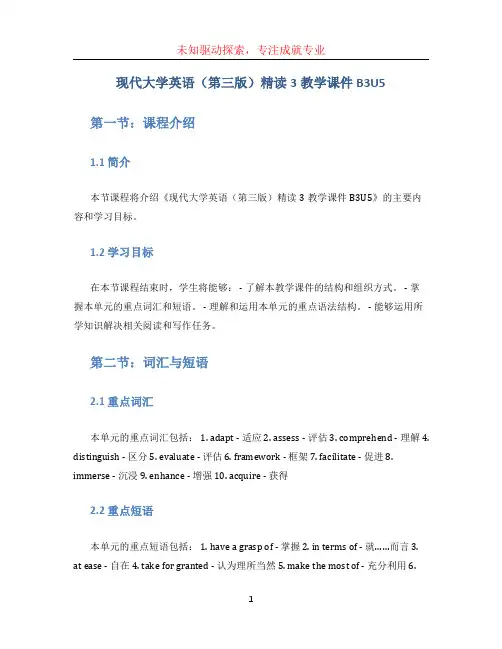
现代大学英语(第三版)精读3教学课件B3U5 第一节:课程介绍1.1 简介本节课程将介绍《现代大学英语(第三版)精读3教学课件B3U5》的主要内容和学习目标。
1.2 学习目标在本节课程结束时,学生将能够: - 了解本教学课件的结构和组织方式。
- 掌握本单元的重点词汇和短语。
- 理解和运用本单元的重点语法结构。
- 能够运用所学知识解决相关阅读和写作任务。
第二节:词汇与短语2.1 重点词汇本单元的重点词汇包括: 1. adapt - 适应 2. assess - 评估 3. comprehend - 理解 4. distinguish - 区分 5. evaluate - 评估 6. framework - 框架 7. facilitate - 促进 8. immerse - 沉浸 9. enhance - 增强 10. acquire - 获得2.2 重点短语本单元的重点短语包括: 1. have a grasp of - 掌握 2. in terms of - 就……而言 3. at ease - 自在 4. take for granted - 认为理所当然 5. make the most of - 充分利用 6.be unaware of - 不知道 7. be exposed to - 接触到 8. fall behind - 落后 9. go beyond - 超越 10. be equipped with - 装备有第三节:语法结构3.1 主动语态和被动语态本单元将重点介绍主动语态和被动语态的用法。
主动语态表示主语是动作的执行者,而被动语态表示主语是动作的承受者。
3.1.1 主动语态主动语态的结构为:主语 + 动词 + 宾语。
3.1.2 被动语态被动语态的结构为:宾语 + be动词 + 过去分词 + by + 主语。
3.2 直接引语和间接引语本单元还将介绍直接引语和间接引语的用法。
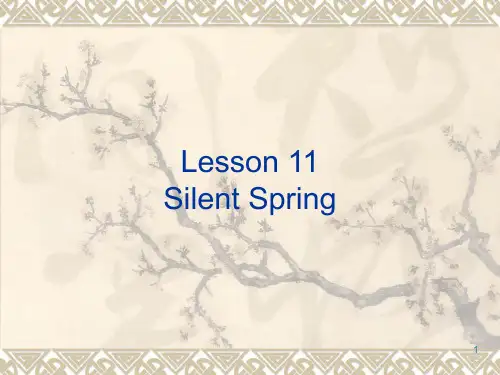
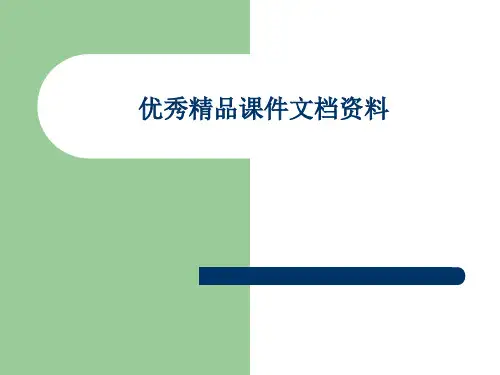
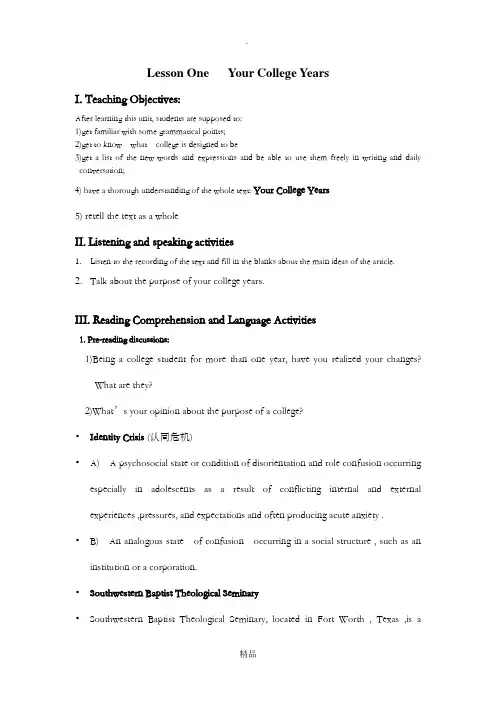
Lesson One Your College YearsI. Teaching Objectives:After learning this unit, students are supposed to:1)get familiar with some grammatical points;2)get to know what college is designed to be3)get a list of the new words and expressions and be able to use them freely in writing and daily conversation;4) have a thorough understanding of the whole text:Your College Years5) retell the text as a wholeII.Listening and speaking activities1.Listen to the recording of the text and fill in the blanks about the main ideas of the article.2.Talk about the purpose of your college years.III. Reading Comprehension and Language Activities1. Pre-reading discussions:1)Being a college student for more than one year, have you realized your changes?What are they?2)What’s your opinion about the purpose of a college?•Identity Crisis (认同危机)•A) A psychosocial state or condition of disorientation and role confusion occurring especially in adolescents as a result of conflicting internal and external experiences ,pressures, and expectations and often producing acute anxiety .•B) An analogous state of confusion occurring in a social structure , such as an institution or a corporation.•Southwestern Baptist Theological Seminary•Southwestern Baptist Theological Seminary, located in Fort Worth , Texas ,is aprivate ,non-profit institution of higher learning associated with Southern Baptist convention whose stated mission is“to provide theological education for individuals engaging in Christian ministry .”It is one of the largest seminaries in the world and is credited by the Associations of Theological schools and also by the Southern Association of Colleges and Schools toward diploma, masters and doctoral degrees. The school uses the Baptist and Message as its confession of faith .3. About the text:It’s about the author’s idea towards the college years. It can be divided into six parts:Part 1 (para.1) Introduction: College students will go through key changes in their college years.Part 2 (Para. 2-6) Establishment of college students’personal sexual and social identity in the college.Part3 (para.7) Affirmation of personal values such as religious faith, their values, and their morals.Part 4 (para.8 ) Development of new ways to organize and use knowledge.Part 5(para.9) Expansion of their world knowledge.Part 6 (para.10) Summary: College students are growing in their understanding of themselves, others and the world in which they live.4. Language points1) Words and expressionsto handle(1)to turn, to lift or turn with the handsThis box contains delicate china .Please handle with care .(2)to operate with handsThis computer is easy to handle .(3)to manage control or cope withThank you . But I can handle it myself .handle n. 把,柄This knife has a carved handle.to apply(1)to make a formal and usually written request for a job , position , permission etcShe is applying for a scholarship(2)to use a method , law ,principle etc in a particular situation(3)applicant n. the one who appliese.g. We should apply this theory to practice.(4)to affect or concern somebody or somethingNot all natural laws can apply to human society .(5)to bring something into nearness or contact with somethingApply some of this ointment to the swollen part ,and the pain will soon be gone .application n.2). Grammatical structure•I knew we had them licked.•She’d never say a word about all the weeks he’d been away, not leaving us a cent for food.•I found myself seeing my father in a different way and relating to him as a friend whom I could encourage.•It seemed to me then that he was always showing off.5. Post-reading discussion:What are your goals for the college years?如有侵权请联系告知删除,感谢你们的配合!。

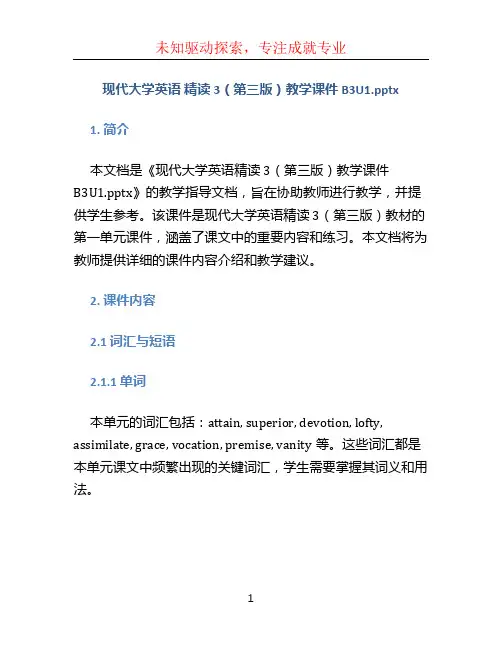
现代大学英语精读3(第三版)教学课件B3U1.pptx1. 简介本文档是《现代大学英语精读3(第三版)教学课件B3U1.pptx》的教学指导文档,旨在协助教师进行教学,并提供学生参考。
该课件是现代大学英语精读3(第三版)教材的第一单元课件,涵盖了课文中的重要内容和练习。
本文档将为教师提供详细的课件内容介绍和教学建议。
2. 课件内容2.1 词汇与短语2.1.1 单词本单元的词汇包括:attain, superior, devotion, lofty, assimilate, grace, vocation, premise, vanity等。
这些词汇都是本单元课文中频繁出现的关键词汇,学生需要掌握其词义和用法。
2.1.2 短语本单元的短语包括:be indicative of, bring out, take…seriously, measure up to, in good part等。
教师可以通过例句和实例来帮助学生理解这些短语的含义和用法。
2.2 阅读理解本单元的阅读理解部分涵盖了三篇文章,分别是《选择正确的途径》、《智慧的力量》和《忠诚的战士》。
教师可以通过课件中的题目和文字说明帮助学生理解文章内容,并进行讨论和解答相关问题。
2.3 语法与写作本单元的语法重点是介词和非谓语动词的用法。
教师可以利用课件中的例句和练习来讲解和巩固学生对这些语法知识的掌握。
此外,课件还包括写作部分,教师可以引导学生根据所学的语法知识写作相关的练习作文。
3. 教学建议3.1 教学方法教师可以采用多种教学方法来教授本单元内容,如讲解法、示范法和讨论法等。
在讲解词汇和短语时,可以先通过示范法来引导学生正确使用,然后进行讨论和实践。
在阅读理解部分,可以采用讨论法来引导学生分析文章内容,并提出自己的见解和观点。
在语法与写作部分,可以通过讲解法和实践法相结合,引导学生掌握语法知识,并培养写作能力。
3.2 学生活动教师应鼓励学生积极参与课堂活动,并提供一些学生活动的建议,如词汇卡片制作和交流、小组讨论、写作练习等。
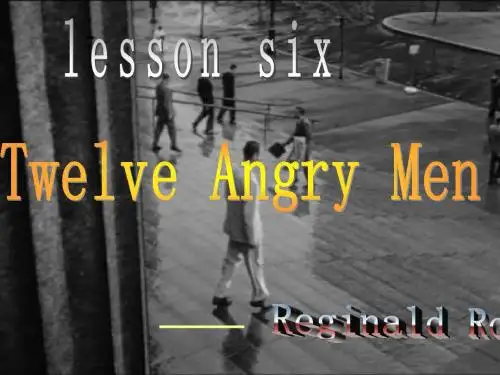
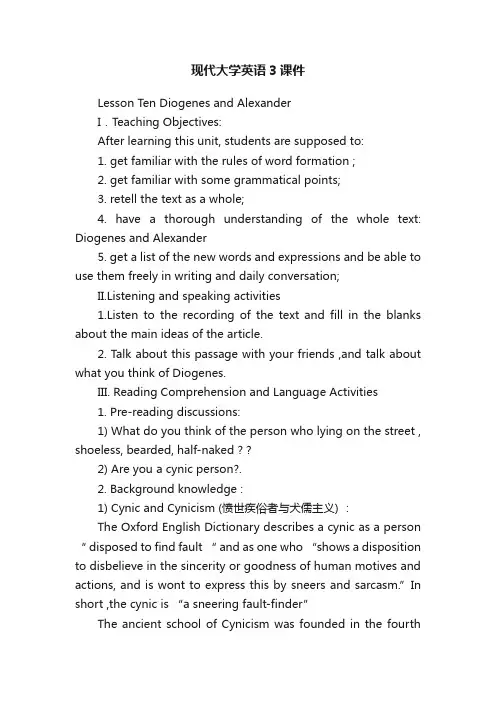
现代大学英语3课件Lesson Ten Diogenes and AlexanderI.Teaching Objectives:After learning this unit, students are supposed to:1. get familiar with the rules of word formation ;2. get familiar with some grammatical points;3. retell the text as a whole;4. have a thorough understanding of the whole text: Diogenes and Alexander5. get a list of the new words and expressions and be able to use them freely in writing and daily conversation;II.Listening and speaking activities1.Listen to the recording of the text and fill in the blanks about the main ideas of the article.2. Talk about this passage with your friends ,and talk about what you think of Diogenes.III. Reading Comprehension and Language Activities1. Pre-reading discussions:1) What do you think of the person who lying on the street , shoeless, bearded, half-naked ? ?2) Are you a cynic person?.2. Background knowledge :1) Cynic and Cynicism (愤世疾俗者与犬儒主义) :The Oxford English Dictionary describes a cynic as a person “ disposed to find fault “ and as one who “shows a disposition to disbelieve in the sincerity or goodness of human motives and actions, and is wont to express this by sneers and sarcasm.”In short ,the cynic is “a sneering fault-finder”The ancient school of Cynicism was founded in the fourthcentury BC by Antisthenes. The Cynics urged both men and women to follow a way of life in harmony with nature and to reject all unnecessary civilized luxuries. They also rejected all social conventions ,customs and laws.2)Diogenes (第欧根尼)Diogenes was a famous Cynic philosopher living during the time of Plato ( the 4th centuryBC ). Having to flee from Sinope because of charges against him and his father for debasing the public coin , Diogenes went to Athens where he studied under comforts of civilized life , and lived an extremely ascetic lifestyle. Later on the captured by pirates and sold into slavery in Crete to Xeniades, who was so impressed by the philosopher that he made him the teacher of his children . He is said to have died of old age in the same year as Alexander the Great in 323 BC.3. Text analysis:Part One (para.1-10) Description of Diogenes as a beggar, a philosopher and a missionary, hislifestyle and doctrine: Cynicism.Part Two (para.11-12) Description of Alexander the Conqueror, who was the greatest man of thetime .Part Three(para.13-17) The dramatic encounter of the two , revealing that only these two menwere the real free man in the world .4. Language points:Words and expressions1)to scratch each other’s backs : 互相挠背(串通一气做互相有利的不正当的事情).2)to do business with that country : 和那个国家做生意.3)publish or perish : 不出版,就完蛋。
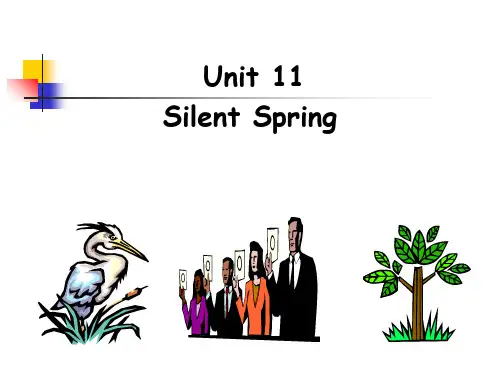
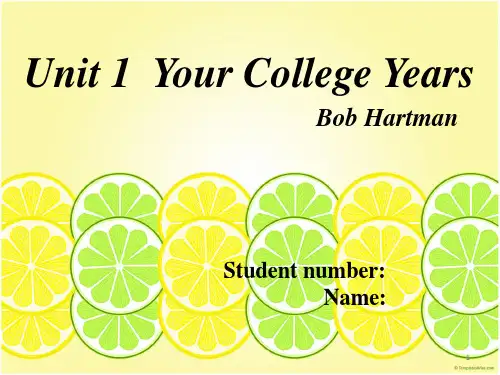
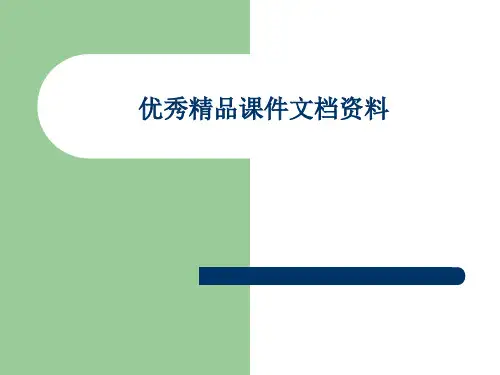
Lesson Ten Diogenes and Alexander
I.Teaching Objectives:
After learning this unit, students are supposed to:
1. get familiar with the rules of word formation ;
2. get familiar with some grammatical points;
3. retell the text as a whole;
4. have a thorough understanding of the whole text: Diogenes and Alexander
5. get a list of the new words and expressions and be able to use them freely in writing and daily conversation;
II.Listening and speaking activities
1.Listen to the recording of the text and fill in the blanks about the main ideas of the article.
2. Talk about this passage with your friends ,and talk about what you think of Diogenes.
III. Reading Comprehension and Language Activities
1. Pre-reading discussions:
1) What do you think of the person who lying on the street , shoeless, bearded, half-naked ? ?
2) Are you a cynic person?.
2. Background knowledge :
1) Cynic and Cynicism (愤世疾俗者与犬儒主义) :
The Oxford English Dictionary describes a cynic as a person “ disposed to find fault “ and as one who “shows a disposition to disbelieve in the sincerity or goodness of human motives and actions, and is wont to express this by sneers and sarcasm.”In short ,the cynic is “a sneering fault-finder”
The ancient school of Cynicism was founded in the fourth century BC by Antisthenes. The Cynics urged both men and women to follow a way of life in harmony with nature and to reject all unnecessary civilized luxuries. They also rejected all social conventions ,customs and laws.
2)Diogenes (第欧根尼)
Diogenes was a famous Cynic philosopher living during the time of Plato ( the 4th century
BC ). Having to flee from Sinope because of charges against him and his father for debasing the public coin , Diogenes went to Athens where he studied under comforts of civilized life , and lived an extremely ascetic lifestyle. Later on the captured by pirates and sold into slavery in Crete to Xeniades, who was so impressed by the philosopher that he made him the teacher of his children . He is said to have died of old age in the same year as Alexander the Great in 323 BC.
3. Text analysis:
Part One (para.1-10) Description of Diogenes as a beggar, a philosopher and a missionary, his
lifestyle and doctrine: Cynicism.
Part Two (para.11-12) Description of Alexander the Conqueror, who was the greatest man of the
time .
Part Three(para.13-17) The dramatic encounter of the two , revealing that only these two men
were the real free man in the world .
4. Language points:
Words and expressions
1)to scratch each other’s backs : 互相挠背(串通一气做互相有利的不正当的事情).
2)to do business with that country : 和那个国家做生意.
3)publish or perish : 不出版,就完蛋。
(西方学界口号).
4)to found a new religion : 建立一个新的宗教
5)to convert RMB into foreign currency : 将人民币换成外币
6)to seek the truth : 寻找真理
7)to discard the old traditions : 抛掉旧的传统
8)to satirize human vanity : 讽刺人的虚荣
9)to inhabit that island : 在那岛上住人
10)to neglect one’s duty : 玩忽职守
11)to escape the consequences : 逃避后果
12)to erase it from one’s memory : 从记忆中消除
13)to take command : 负责指挥
14)to block one’s way : 挡路
15)to ruin one’s reputation : 毁掉名誉
Grammatical structure
(1) Not only do we want it now ;we don’t even want to be kept waiting for it .
A phrase of negative form or meaning occurs at the beginning of a sentence/clause.
(2) Robert never forgot that blessed Christmas. Nither did his father.
An elliptical sentence begins with so,or nor, or neither
(3) Only after much persuasion did Lao Liu agree to be our coach.
A sentence begins with only when followed by an expression of manner, place ,time, or reason
(4) At the head of the parade marched the guards of honor.
A sentence / clause begins with an adverbial of place or position
5. Post-reading discussions:
(1) If the world were to follow Diogenes , what would be the result ?
(2)What does the brief dialogue mean to you ? Why did Diogenes say that Alexander was blocking the sunlight? Did Alexander know what he mean ? Why did Alexander say that if he were not Alexander, he should be Diogenes ? Did the two have anything in common ?。